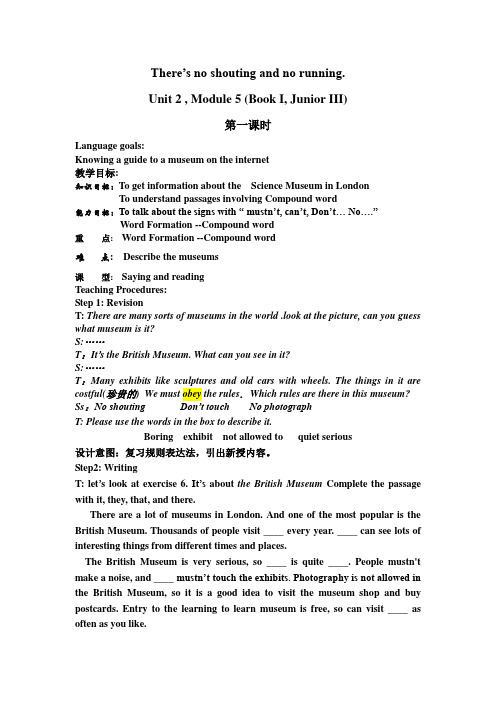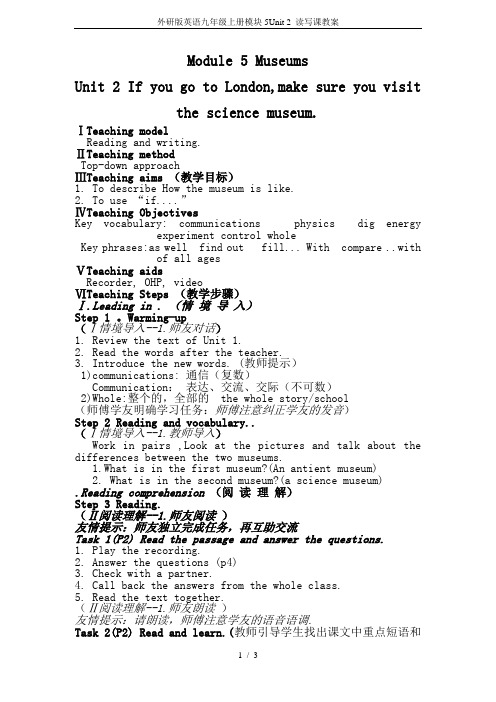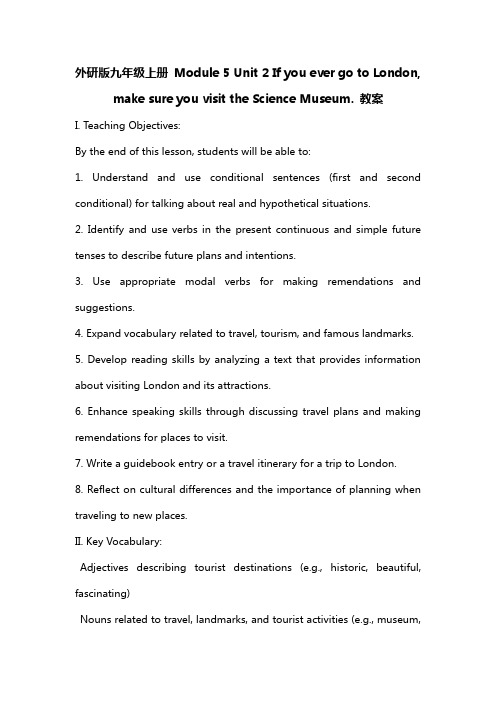外研版九年级英语上册教案 M5 Unit 2
外研版英语九年级上册Module 5 Unit 2 教学设计

教学文档如有疑问,请联系网站底部工作人员,将第—时间为您解决问题!文件预览:Module 5 MuseumsUnit 2 If you ever go to London, make sure you visitthe Science Museum.教学目标(知识目标)能够正确使用以下单词和词组:sand, wheel , try out , work out , experiment, physics, obey, above all ,speed, drop in .as……as , human . travel , rocket , position, unusual,communication.(能力目标)1. 能够读懂简单介绍伦敦博物馆的短文。
2. 能够对自己所熟悉的博物馆进行简单的描述。
(感情态度目标)培养对博物馆的兴趣,通过了解伦敦博物馆,,强化对西方文化的了解。
教学重难点(教学重点)能够读懂介绍伦敦博物馆的短文,并能在阅读中找出参观展馆时的一些考前须知以及遵守的规则。
(教学难点)if从句及表示禁止的祈使句教学过程Step1 Warming up1. Ask thestudents to look at the pictures in Activity 1.2. Talk about thepictures. 3. Look at thepictures and talk about the differences between the two museumsStep 2 Readingand vocabulary1. Introduce the ScienceMuseum in London and show some picture and videos.2. Ask the students to read through the passage andanswer the question.Howis the Science Museum different from other museums3. Learn some new words.Step3 Complete the table.1. Read the passageagain.2. Complete theTony’s favourite museum column in the table.Module 5 Unit 2 教案2021-4-25 21:28全部教学资源,免费、延续更新。
九年级英语外研版上Module5 Unit2 教案

There’s no shouting and no running.Unit 2 , Module 5 (Book I, Junior III)第一课时Language goals:Knowing a guide to a museum on the internet教学目标:知识目标:To get information about the Science Museum in LondonTo understand passages involving Compound word能力目标:To talk about the signs with “ mustn’t, can’t, Don’t… No….”Word Formation --Compound word重点: Word Formation --Compound word难点: Describe the museums课型: Saying and readingTeaching Procedures:Step 1: RevisionT: There are many sorts of museums in the world .look at the picture, can you guess what museum is it?S:……T:It’s the British Museum. What can you see in it?S:……T:Many exhibits like sculptures and old cars with wheels. The things in it are costful(珍贵的)We must obey the rules.Which rules are there in this museum? Ss:No shouting Don’t touch No photographT: Please use the words in the box to describe it.Boring exhibit not allowed to quiet serious设计意图:复习规则表达法,引出新授内容。
外研版初中英语九年级上册module5unit2教学设计新部编版

教师学科教案[ 20 – 20 学年度第__学期]任教学科:_____________任教年级:_____________任教老师:_____________xx市实验学校外研版初中英语九年级上册Module 5 MueseumsUnit2 There’s no shouting and no running教学设计一、教案背景1,面向学生:□中学□小学 2,学科:英语2,课时:13,学生课前准备:一、预习单词和词汇。
二、能够根据自己的情况预习教材并进行拓展。
三、能够借助图片、生活情境介绍公共场合规则问题。
四、让学生提出自学中遇到的问题。
二、教学课题Module 5 MueseumsUnit2 There’s no shouting and no running三、教材分析本课是本模块的第二课时,在整个模块中起主导作用,侧重训练学生的听说能力。
本模块的主题是“博物馆”(Museums), 全部对话都是围绕参观展馆时的一些注意事项以及应遵守的规则进行编排的。
另外,本节课时的教学内容与设计预测可以使学生基本掌握整个模块的中心任务“能发出指令,提示某人不要做某事”。
此外,“There’s no shouting and no running ”是一篇有关礼节的阅读,是对整个单元的升华,在前几节课中,学生运用了Let’s go to the Science and Technology room. No shouting ! No entry. No photography等有礼貌地对别人发出请求和命令,本节课通过文章进一步加深对有礼貌请求句式的理解和在生活中的具体运用,同时通过对中西方礼节的对比和描述,使学生可以感受到在这个由“人”组成的社会中,每个人只有规范好自己的言行,讲究礼节,才能使整个社会处于一个“有序、和谐”的社会状态里,由此进一步提高学生的听、说、读写的综合能力。
学情分析:1. 大部分学生来自附近的农村,由于学生对英语很有兴趣,学习热情较高,乐于参与各种英语实践活动,能在小组活动中积极与他人合作,互相帮助,共同完成学习任务。
外研版九年级英语上册教案Module 5 Unit 2(外研)

Module 5 MuseumsUnit 2 If you ever go to London, makesure you visit the Science Museum同步练习The reading material mainly introduce Tony’s favourite museum—the Science Museum in London. People can not only talk about what they can do but also do many kinds of experiments there. Students can learn about the differences among museums and different cultures. And they are expected to write about their favourite museums.1.To understand the passage involving new words: experiment\chemistry\physics\control\X-ray2.To read for the main idea and specific information.能力目标:1、T o activate students’ imagination step by step and open their minds.2、To lead students to write creatively by PWP approach.情感目标:1.To help students cooperate in pair or group work.2.To enhance students’ awareness of obeying public rules and morals.drop in .as……as , human, travel, rocket, position, unusual, communication.2、能够读懂介绍伦敦博物馆的短文,并能在阅读中找出参观展馆时的一些注意事项以及遵守的规则阅读获取信息,培养学生阅读技能。
外研版英语九年级上册模块5Unit 2 读写课教案

Module 5 MuseumsUnit 2 If you go to London,make sure you visitthe science museum.ⅠTeaching modelReading and writing.ⅡTeaching methodTop-down approachⅢTeaching aims(教学目标)1. To describe How the museum is like.2. To use “if....”ⅣTeaching Object ivesKey vocabulary: communications physics dig energy experiment control wholeKey phrases:as well find out fill... With compare ..with of all agesⅤTeaching aidsRecorder, OHP, videoⅥTeaching Steps(教学步骤)Ⅰ.Leading in . (情境导入)Step 1 。
Warming-up(Ⅰ情境导入--1.师友对话)1. Review the text of Unit 1.2. Read the words after the teacher.3. Introduce the new words. (教师提示)1)communications: 通信(复数)Communication:表达、交流、交际(不可数)2)Whole:整个的,全部的 the whole story/school(师傅学友明确学习任务:师傅注意纠正学友的发音)Step 2 Reading and vocabulary..(Ⅰ情境导入--1.教师导入)Work in pairs ,Look at the pictures and talk about the differences between the two museums.1.What is in the first museum?(An antient museum)2. What is in the second museum?(a science museum).Reading comprehension(阅读理解)Step 3 Reading.(Ⅱ阅读理解--1.师友阅读)友情提示:师友独立完成任务,再互助交流Task 1(P2) Read the passage and answer the questions.1. Play the recording.2. Answer the questions (p4)3. Check with a partner.4. Call back the answers from the whole class.5. Read the text together.(Ⅱ阅读理解--1.师友朗读)友情提示:请朗读,师傅注意学友的语音语调.Task 2(P2) Read and learn.(教师引导学生找出课文中重点短语和句子。
Module5Unit2教案-外研版九年级上册英语

Unit 2 If you ever go to London, make sure you visit the Science Museum.ⅠTeaching modelReading and writing.ⅡTeaching methodBottom-up approachⅢ Teaching aims1. To understand the passage;2. To get the main idea of each paragraph;3. To learn to use pronouns correctly in writing.Ⅳ Teaching ObjectivesKey vocabulary: communications, physics, chemistry, dig-dug-dug, coal, energy,X-ray, experiment, sand, control, truck, wheel, compare… with/ to, of all ages, wholeⅤ Teaching aidsOHP, multi-mediaⅥ Teaching StepsStep 1 Warming up1. Ask the students to look at the pictures in Activity 1.2. Talk about the pictures.3. Look at the pictures and talk about the differences between the two museumsStep 2 Reading and vocabulary1. Introduce the Science Museum in London and show some picture and videos.2. Ask the students to read through the passage and answer the question.How is the Science Museum different from other museums?3. Learn some new words.Step 3 Complete the table.1. Read the passage again.2. Complete the Tony’s favourite museum column in the table.3. Check the answers.Step 4 Answer the questions.1. Ask the students to read the words in the box in Activity 4.2. Ask the students to read through the questions in Activity 4.1) What can you learn about in the rooms on the second and third floors?2) What allows you to see inside your body?3) What can you do in the Launchpad?4) What can you learn about on the fourth and fifth floors?3. Finish the task.4. Check the answers.Step 5 Language points1. … if you w ant to fill a bag with sand, you have to control a kind of track on wheels and move it into the correct place. …如果你想将袋子装满沙子,你得操控一种带轮子的运输车,并把车移动到正确的位置。
外研版九年级英语上册教案 Module5 Unit2 (4)

Module 5 MuseumsUnit 2 If you ever go to London, make sure you visit the ScienceMuseum.学习目标:1.找出两个博物馆的不同。
2.阅读短文找到信息。
3.重点单词和短语的学习能力目标:掌握短文信息及细节,重点单词和短语的正确运用情感目标:了解他国文化,接受公共道德教育。
学习重点: 1. 重点单词和短语的正确运用。
2.If从句+祈使句学习难点: 1.本课所学单词,短语以及它们的用法2.If从句+祈使句学习过程:一.复习检测阅读理解(建议用时4分钟)What is a museum? A museum is a good place to keep old and beautiful things. A museum may be a place to learn about science and a place to find out about art or people or animals.What is inside a museum? Some museums have old cars and airplanes. Many museums have pictures and statues. Others have rocks and old bones. One museum even has a real old street inside. It has shops and people’s statues doing business. It looks so real that one might feel that he was back to the old times.Many cities have museums. Some very small towns have museums, too. Indianapolis has a children’s museum. Children do not have to pay toget in. Children often go to the museum. They like to look at the dinosaur bones. They can see a white bear ten feet tall.On Saturdays, Indianapolis children can hear talks about animals and trees. They see movies. They even learn to make things there.1. What is NOT true about a museum?A. It’s a good place to do some shopping..B. People can learn about science there.C. People can learn about the history of a place there.D. It’s a good place to learn about art.2. People cannot in a museum.A. see moviesB. listen to talksC. make thingsD. play with bears3. In Indianapolis, .A. there is only one museum for childrenB. it’s free for children to visit the children’s museumC. people do not have to pay to visit the children’s museumD. museums are all the same4. In the children’s museum in Indianapolis, children like to see .A. the dinosaur bonesB. all old bonesC. old streetsD. airplanes5. The main idea of the passage is that .A. old cars and airplanes are kept in museumsB. children like museumsC. there are all kinds of museumsD. animals and trees are found in museums二.自主探究:(先独学、再对学然后群学,小组讨论核对答案并找出对应信息)1. Reading (Read the passageP36 in many different ways.)相信你是最棒的2.完成下列各题1) His brother is not only a singer, but also an actor. (改为同义句)His brother is a singer _________ _________ _______ an actor.2) You mustn’t tell it to anyone. (改为祈使句)Please _________ _________ it to anyone.3) Susan, please lay the table for five. Tommy is coming too.(改为同义句Susan, please lay the table for five. Tommy is coming _________ _________4) If you _________ (not feel) well, _________ (stop) to have a rest5) Li Lei advised me to put up a “No _________(litter)” sign on the wall.三.展示提升1.细读课文解决文章中的重点,难点(小组合作,教师点拨)2. 看谁是翻译高手1)放风筝在所有年龄段的人中都受欢迎。
Module5Unit2教案九年级英语上册

外研版九年级上册Module 5 Unit 2 If you ever go to London, make sure you visit the Science Museum. 教案I. Teaching Objectives:By the end of this lesson, students will be able to:1. Understand and use conditional sentences (first and second conditional) for talking about real and hypothetical situations.2. Identify and use verbs in the present continuous and simple future tenses to describe future plans and intentions.3. Use appropriate modal verbs for making remendations and suggestions.4. Expand vocabulary related to travel, tourism, and famous landmarks.5. Develop reading skills by analyzing a text that provides information about visiting London and its attractions.6. Enhance speaking skills through discussing travel plans and making remendations for places to visit.7. Write a guidebook entry or a travel itinerary for a trip to London.8. Reflect on cultural differences and the importance of planning when traveling to new places.II. Key Vocabulary:Adjectives describing tourist destinations (e.g., historic, beautiful, fascinating)Nouns related to travel, landmarks, and tourist activities (e.g., museum,tour, attraction)Verbs associated with traveling and remending (e.g., visit, explore, see, remend)Adverbs indicating frequency and possibility (e.g., always, never, possibly)III. Target Language Structures:First conditional sentences ("If ..., then ...") for predicting outes based on conditions.Second conditional sentences ("If ... were to ..., then ... would ...") for talking about unlikely or imaginary situations.Use of the present continuous tense for current travel plans or arrangements.Simple future tense for predicting future actions and events related to travel.Modal verbs (should, must, might) for giving advice or expressing likelihood in a travel context.IV. Teaching Aids:Maps of London highlighting major landmarks and attractions. Whiteboard and markers for grammar explanation and writing key sentences.Audio material featuring dialogues or narratives about travel experiences in London.Handouts with exercises on conditional sentences, future tenses, modal verbs, new vocabulary, and a writing prompt for a travel guide or itinerary.V. Teaching Procedures:Step 1: Warmup (5 minutes)Begin with a discussion about previous travel experiences and dream destinations.Elicit key vocabulary from students and write it on the board.Step 2: Listening (10 minutes)Play an audio track that presents a conversation about planning a trip to London.After listening, ask prehension questions to check understanding of the content.Step 3: Speaking Practice (15 minutes)Students work in pairs or small groups to discuss their own hypothetical trips to London and plan what they would like to do and see. Conduct a class activity where each group shares their travel plans and gives remendations using conditional sentences and future tenses. Step 4: Grammar Focus (10 minutes)Review the usage of first and second conditional sentences for talking about real and hypothetical situations.Introduce and practice the present continuous and simple future tensesin the context of travel planning.Review the use of modal verbs for giving advice and expressing possibility in a travel context.Step 5: Reading (10 minutes)Distribute a text about London's attractions, guiding students through it to identify target language structures and new vocabulary.Ask students to summarize the main points and the remendations given in the text.Step 6: Writing Task (10 minutes)Hand out worksheets with exercises on constructing sentences using conditional sentences, future tenses, and modal verbs.Assign a written task where students create a guidebook entry or a travel itinerary for a trip to London, based on their own research or imagination.Step 7: Homework & Review (5 minutes)Assign homework for students to plete their guidebook entry or travel itinerary, incorporating feedback from the writing task.Review key points from the lesson through a quick quiz or verbal questioning.VI. Assessment:Evaluate students based on their participation in speaking activities, correct usage of conditional sentences, future tenses, and modal verbs inoral and written assignments, and pletion of homework tasks.Assess listening skills through prehension questions related to the audio content about planning a trip to London.Assess reading prehension through a short quiz targeting the main points and details of the provided text about London's attractions. Review the ability to express future plans, make remendations, and talk about hypothetical travel scenarios using the learned language structures and vocabulary.。
- 1、下载文档前请自行甄别文档内容的完整性,平台不提供额外的编辑、内容补充、找答案等附加服务。
- 2、"仅部分预览"的文档,不可在线预览部分如存在完整性等问题,可反馈申请退款(可完整预览的文档不适用该条件!)。
- 3、如文档侵犯您的权益,请联系客服反馈,我们会尽快为您处理(人工客服工作时间:9:00-18:30)。
Book 5 Module 5 Museums
一、教学内容:Unit 2 If you ever go to London, make sure you visit the Science Museum.
二、课型:Reading and writing
三、教学目标:
1、能够听懂并正确地朗读下列单词:communications,physics,chemistry,Dig coal,
energy,X-ray,experiment,sand,control,truck,wheel,compare…wit h,of all ages,whole
2、语法:能掌握用if引导的条件状语从句。
3、能够读懂介绍博物馆的短文,理解公开场所的常用标语。
4、能描写自己喜爱的博物馆,并能正确使用代词it, they, there
四、教学重难点:
1、能够理解介绍博物馆的短文。
2、能够正确运用if等词引导的状语从句于写作之中。
五、教学准备:课堂整体运用任务型教学模式以及阅读课“四个阶段”教学模式。
本课
指导学生通过阅读获取信息,培养学生阅读技能。
在教学过程中,采用多媒体手段辅助教学,利用各种图片和习题任务贯穿整个教学过程。
因此,本节课需准备:PPT课件。
六、教学过程:
达标训练题
Quiz
Ⅰ. 用方框里的词的适当形式完成句子。
sand control energy truck chemistry
1. With growth, demand for ________ continues to rise.
2. Look over there! The kids are playing with ________ on the beach.
3. I’m afraid that the ________ isn’t large enough to carry all the things.
4. __________ was her favorite subject at school.
5. It’s difficult to _______ an aircraft a t high school.
Ⅱ. 根据要求完成下列句子。
1. Shakespeare was not only a writer but also an actor. (改写同义句)
Shakespeare was an actor ___________ a writer.
2. He wrote hundreds of beautiful pieces of music for the orchestra as well. (改写同义句)
He _______ wrote hundreds of beautiful pieces of music for the orchestra.
3. If you ________ her work _______ his, you’ll find hers is much better.
要是比较一下他们两个的作品,你就发现她的好很多。
4. 如果你能来,请告诉我。
——————————————。
